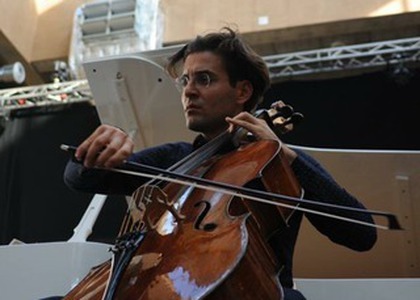> [Archived] Interviews

Interview with cellist Valentin Rădutiu
The 56th edition of the International Festival "Cluj Musical Autumn" begins on Friday, October 13th, with a concert performed by the "Transylvania" State Philharmonic Choir and Orchestra under the baton of conductor Gregory Vajda. The soloist of the event is the cellist ValentinRăduțiu, who will perform a page from the creation of the composer Ernest Bloch: "Schelomo: Hebrew Rhapsody" for cello and orchestra.
To begin with, I would like you to tell us a little bit about the piece you have chosen, from the work of Ernest Bloch.
I will perform a special piece, called Schelomo: Hebrew Rhapsody, a piece in which Bloch put the mind of Judaism into sound; Salomon speaks of course, as in the sermon, to the people, and I'm really moved by the context that, surely, none of us could have suspected... that this concert will take place in the context of the terrible political situation and the things that happening in Israel. So I am at the cello playing this piece in person for the first time with more special thoughts; it's a very mystical and very dark piece. It is very much, indeed, about the vanity of man. In this play we cannot even hope for an optimistic outlook. Bloch said that all his works end with a look to the light, only that this piece ends darkly, with this idea of vanity and the end of the world. But of course, this should not scare the listener. It is a particularly emotional, colorful piece, we have a more exotic sound language, many harmonies, intervals and sound effects that take us to another world, so it will be, for me, a special premiere and I think not even at the Philharmonic in Cluj this work has not been performed for a very long time.
When you chose the work, what were you thinking about?
I chose a more emotional piece. In a broad context, I proposed a season with many novelties - new pieces and challenges. You know how it really is... in the cello repertoire, a few hits are played over and over again. Cellists sometimes complain that the repertoire is not that complex, but in fact, in addition to the 5-6-7 battle stallions - Dvorak Concerto, "Rococo", Concertos by Haydn, by Schumann, Elgar - we have many works which are rarely heard and which, in fact, are particularly beautiful. I am fascinated by the cantability of the cello in this piece, a way of singing that can also be heard in the synagogue, absolutely unique. I also enjoyed dealing with the prints we have. I don't want to criticize his colleagues, but from my soul understanding of this piece... a lot of times, the cellists show their muscles, and the intensity, and how extraordinary they can play... I had listened to Fournier with an old recording in which he captures this internalized and highly reflective note in a very unique way. On the first page of the concerto we barely find a forte, in fact, and often it starts immediately with the biceps so trained... There are several sides - both cello and philosophical - that fascinate me in this piece and so I decided to start with her and return to Cluj, I think many years have passed; then I was with a standard of the repertoire, Haydn - D major. And now, a little more mature, older and perhaps a little wiser, with a piece that requires a certain wisdom of the performer. Of course, I'm too young to take it on, but I'd aim for it.
What do you think about joining the works from the program in the concert? Is this Hebrew Rhapsody preceded by the Tragic Overture by Brahms and followed by Bela Bartok's "Miraculous Mandarin"?
Sure, a music historian can find connections between anything. Everything in the world, in life and in art has a certain relationship. So, on a slightly simpler level, suggestive of course, the word "tragic" in the overture speaks to us and creates an atmosphere after which Schelomo can begin in a special light. The piece begins with a cello sound, just the cello alone. Then there is another work that is highly complex and not often performed, so I am very excited about a program that asks the audience to dedicate themselves, to have the patience to listen, to transpose themselves into a receptive inner state.
Photo credit: Emilija Weimann
Translated by Denisa-Elena Cincă,
University of Bucharest, Faculty of Foreign Languages and Literatures, MTTLC, year II
Corrected by Silvia Petrescu














